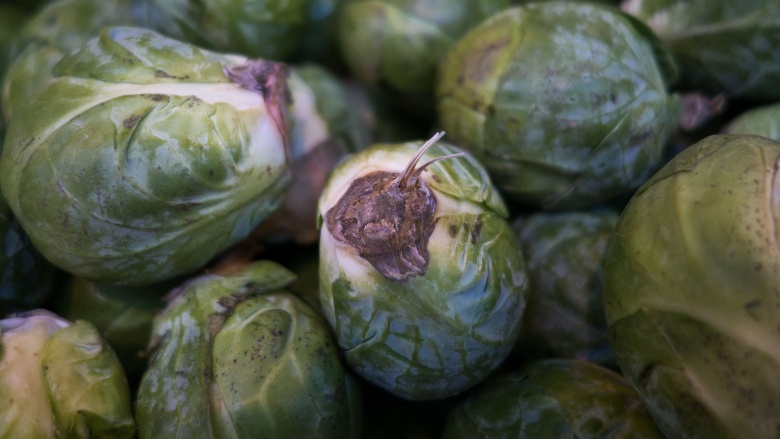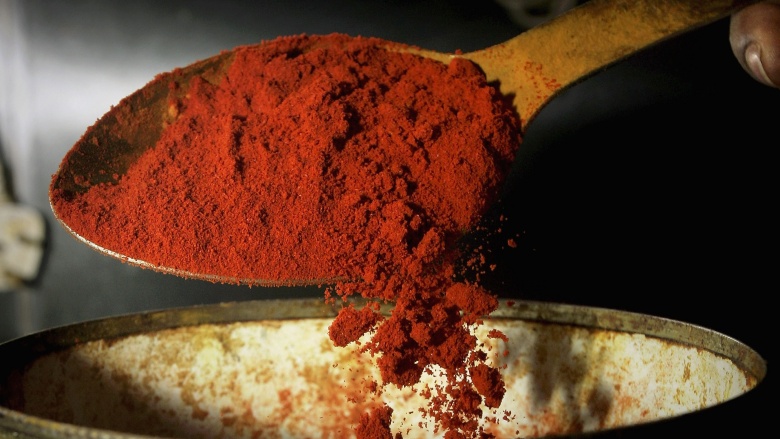Why These Vegetables Make You Stink
Everyone should eat more vegetables, there's little doubt about that. We need them to keep us strong and healthy! But it's an unfortunate irony that if you're eating veggies in an attempt to improve your life, there might be some unexpected drawbacks—because vegetables can make you stink. And it's not just the most obvious ones either. So next time you have a hot date, be smart and pass on the cabbage.
Asparagus
Ten minutes on a hot grill with a little salt and pepper: a fresh and tender asparagus shoot is definitely one of the great tastes of summer. It is also fabled to be an aphrodisiac...which is interesting, since it doesn't do you any favors in the olfactory department. It's a well-known fact that eating asparagus some people's pee smell funky, and that's because asparagus contains several organic compounds that, when metabolized by your body turn into various ammonia and sulfur products. The effect of asparagus on pee odor is isn't much of a secret, and has been a documented phenomena for hundreds of years. But while the smell it creates is unpleasant, it might turn out to be a non-issue in terms of giving offense since most people pee in private. And if you're serving it with an eye on it's claimed romantic applications, you'd best try to avoid sharing a bathroom.
Garlic
Where asparagus is only offensive in the privacy of your own bathroom, garlic has the potential to get a whole lot more public. Like asparagus, the pungent effects of garlic are created as sulfur compounds within it are metabolized producing allyl methyl sulfide. This compound is a mover and shaker, and doesn't float quietly into your bladder. Instead it makes its way to your lungs, where it can escape on your breath. It doesn't stop there, though, as the compound also heads to your skin where it's secreted with your sweat, making you doubly rank. The worst part is that since the smell is coming from your lungs and pores, brushing your teeth and washing have very limited effect. The odor lasts for hours. So if you're interested in deterring mythical blood sucking monsters, then feel free to add some extra garlic to your dinner. But Dracula won't be the only one avoiding you if you do.
Cruciferous vegetables
Cruciferous vegetables like Brussels sprouts, broccoli, and cabbage are full of all sorts of good stuff that your body needs to stay healthy, and that includes fiber. Fiber is good for your digestion, but it comes with the unfortunate side effect of making you "toot," which happens to be the perfect distribution mechanism for the now familiar and abundant sulfur compounds that are also found in this family of vegetables. And although a lot of people are very fond of sprouts and broccoli and the rest of them, their tendency to activate the odor artillery might explain why restaurants rarely serve a lot of them in each helping.
Alcohol
True: alcohol is not really a vegetable. But the stuff you drink (beer, vodka, whiskey, grampa's bathtub gin) are made from plants and grains. And if you're not careful, it can have some unfortunate olfactory effects. Alcohol can have two significant but separate influences on your personal fragrance. When you drink an alcoholic beverage, the alcohol is metabolized into acetic acid, which, along with remnant alcohol in your blood stream, is excreted through your pores. If you drink too much, the levels will build up to the point where you develop unpleasant stale alcohol body odor. Excessive consumption will also cause dehydration and can make you snore when you fall asleep. Snoring is usually a mouth-open kind of activity, and when combined with your already dehydrated state, will result in a very dry mouth and some very bad breath. And no matter how much fun you had the night before, being greeted by a face full of stank in the morning will put anyone off a repeat performance.
Curry, cumin
All those delicious spices like curry and cumin are a quick and easy way to add a little zing to your dinner. Unfortunately they don't stop seasoning when you stop cooking. Because all that concentrated flavor that so easily permeates through your food just as easily permeates through you. This isn't always a bad thing, because the herbs and spices that make you sweat also raise your metabolism and help you to burn calories. But if you eat them too often, they'll start to come out in your sweat, and you'll find yourself advertising your spicy preferences through your skin. So if your partner likes you covered in a tasty curry marinade, then keep right on sweating. But if not, or if your internet dating app doesn't have a checkbox for self-seasoning, then maybe just save it for a special occasion.
Coffee
The coffee bean, actually the seed of a fruit, is obviously the main ingredient in America's favorite wake-up juice. The reason for that popularity is that coffee contains the stimulant caffeine, which wakes you up and speeds your metabolism. It is also slightly acidic, and has a diuretic effect (it makes you pee). If you drink too much coffee, you get the combination of a raised metabolism that can make you sweat, an acid stomach that can upset your digestion and cause flatulence, and dehydration that leads to a dry mouth and bad breath...quite the combination. So on those days when a couple of cups just isn't enough, you're left with a choice: stay sleepy and dumb, or wake up and smell.
Legumes
Beans are a great source of fiber, which as well as benefiting the digestion and general health of the bowels can also react in your intestine to produce both voluminous but unexciting gases like carbon dioxide, hydrogen, and methane, as well as less sociable volatile sulfur compounds. And while the unexciting gases will make you feel bloated and sound like a deflating balloon, the volatile sulfur compounds will make you feel lonely. But as with so many things in life, the answer lies in moderation. A little of what you like will get you a long way, but a lot will get you kicked out of the swimming pool.







